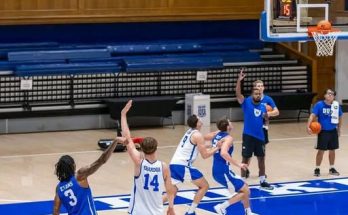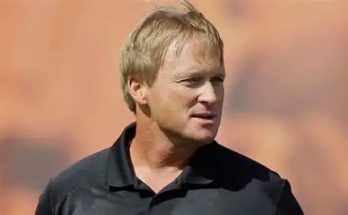The Edmonton Oilers are leaving no stone unturned in their pursuit of sustained excellence and a potential Stanley Cup run, and that commitment to elevating every aspect of the organization just took a bold new step. With the addition of Paul McFarland as an assistant coach, Peter Aubry as goaltending coach, and Conor Allen as a skills development coach, the Oilers have initiated a strategic revamp of their coaching staff designed to enhance tactical flexibility, goaltending efficiency, and individual player development. This significant move, announced ahead of the 2025-26 NHL season, signals that Edmonton’s front office—led by General Manager Jeff Jackson and Head Coach Kris Knoblauch—is fully locked in on raising the team’s ceiling in all phases of the game.
Paul McFarland’s arrival is perhaps the most eye-catching. A veteran coach with NHL experience, McFarland brings a wealth of knowledge and a track record of maximizing offensive potential. Known for his detailed systems work and success on special teams, he most recently served in coaching roles with the Toronto Maple Leafs and the Florida Panthers. In Toronto, McFarland was credited with orchestrating one of the league’s most dynamic power plays during the 2019-20 season, helping stars like Auston Matthews, Mitch Marner, and John Tavares elevate their already elite games. His offensive acumen and ability to design effective set plays in both five-on-five and man-advantage situations will be invaluable to a team like the Oilers, who already possess high-end talent in Connor McDavid, Leon Draisaitl, and Ryan Nugent-Hopkins. The hope is that McFarland can inject more structure and creativity into Edmonton’s offensive attack while ensuring that depth players are also put in positions to succeed.
McFarland’s influence is expected to go beyond the whiteboard. His reputation for connecting with players, being analytically forward-thinking, and adapting game plans on the fly makes him a valuable asset in today’s NHL, where speed, skill, and flexibility are paramount. As an assistant coach under Kris Knoblauch—who is entering his second full season behind the Oilers bench—McFarland will be entrusted with drawing out even more performance from Edmonton’s top six forwards while fostering greater scoring depth from the bottom half of the lineup. With a team as top-heavy as the Oilers, McFarland’s challenge will be to bridge the gap between star power and role players through cohesive, purposeful systems.
Meanwhile, the addition of Peter Aubry as the team’s new goaltending coach marks a notable shift in Edmonton’s approach to managing its netminders. Aubry, who spent nearly a decade working in the Philadelphia Flyers organization, has earned a reputation as one of the NHL’s most diligent and technically sound goalie developers. His work with AHL-level goaltenders in Lehigh Valley helped produce serviceable NHL-caliber depth for the Flyers, and his ability to work with both young prospects and veteran netminders bodes well for Edmonton’s goaltending pipeline.
Aubry joins the Oilers at a critical juncture for their goaltending situation. Stuart Skinner, the team’s current No. 1, has shown flashes of brilliance but has also struggled with consistency during deep playoff runs. Behind him, the depth is uncertain, and the club has faced frequent questions about whether their netminding is truly championship-caliber. With Aubry at the helm, there is renewed hope that Skinner can find greater consistency, improve his rebound control, and enhance his puck-tracking ability—critical attributes for success in today’s high-paced game. Aubry’s role may also extend to mentoring any younger goaltenders coming through the system or even working with potential midseason acquisitions, should Edmonton look to shore up its crease via trade or waiver wire.
Conor Allen’s appointment as a skills development coach may not draw the same immediate headlines as McFarland or Aubry, but his presence could be one of the most forward-thinking and impactful additions in the long term. A former pro defenseman who spent time in the AHL and had brief NHL stints with the New York Rangers, Allen has quietly built a strong reputation as a development coach focused on puck skills, skating mechanics, and individualized player improvement. He has worked closely with prospects in junior leagues, collegiate programs, and minor pro settings to help them refine their skill sets in real-time, game-action contexts.
In Edmonton, Allen will be tasked with bringing this individualized development philosophy to an NHL environment. That includes not only working with younger players on the cusp of the roster—such as Philip Broberg and Dylan Holloway—but also supporting established players looking to round out their games. For a team like the Oilers, who frequently lean on their star power but often suffer when role players don’t elevate their games, this focus on skills development could be crucial. Allen is expected to work closely with both the coaching staff and the player performance department to ensure that technical refinement doesn’t get lost in the grind of the NHL schedule. From stickhandling under pressure to edgework and shooting precision, his influence could become the hidden engine behind breakout performances.
These three coaching additions arrive in a broader context of heightened urgency for the Oilers. After several seasons of playoff heartbreak and unmet potential, Edmonton’s leadership core knows that their window for contention is now. Connor McDavid and Leon Draisaitl remain in their primes, but with the latter’s contract situation looming as a topic of national intrigue, the time to deliver is immediate. By bolstering their coaching staff with specialists who each address a key area of concern—tactics, goaltending, and skills development—the Oilers have moved to eliminate excuses and reduce systemic weaknesses.
For Head Coach Kris Knoblauch, who took over in November of last season and guided the team through a rollercoaster second half, this trio of new hires represents both support and accountability. McFarland’s arrival, in particular, allows Knoblauch to delegate offensive systems work to someone with deep experience and a proven NHL track record. It also signals trust from the front office that Knoblauch will effectively manage a more robust and specialized staff. With greater depth in the coaching ranks, the Oilers are positioning themselves to be more adaptable during the regular season and more dangerous in playoff scenarios where adjustments and matchups often determine outcomes.
The revamped coaching staff also illustrates Edmonton’s willingness to invest in the types of behind-the-scenes improvements that separate great teams from merely good ones. In the modern NHL, player development, goalie optimization, and tactical diversity are not luxuries—they are necessities. The best organizations understand that competitive edges often come from the margins, whether that’s a power play tweak that converts in a Game 7 or a backup goalie who steals a crucial start. The Oilers, long known for their firepower, are now showing signs that they understand the broader blueprint for success.
It’s also worth noting that all three hires reflect a deliberate move toward modern, player-focused coaching. Gone are the days when NHL benches were dominated by autocratic voices and rigid systems. Today’s athletes expect communication, customization, and a coaching environment that emphasizes continuous growth. McFarland, Aubry, and Allen each bring a teaching mindset to their roles, emphasizing collaboration, adaptability, and progress. That culture—if embraced throughout the organization—could serve as a much-needed antidote to the inconsistencies that have plagued the Oilers during their playoff runs.
The timing of the coaching overhaul is equally strategic. With training camp just around the corner, Edmonton will now have several weeks to integrate the new voices into daily routines and begin reshaping on-ice habits. Early buy-in from the players will be essential, especially for veterans who have grown used to a certain rhythm and may need time to adjust to new systems or drills. The Oilers’ leadership group—including McDavid, Draisaitl, and veteran defensemen like Darnell Nurse and Mattias Ekholm—will play a pivotal role in reinforcing the value of these new additions.
Ultimately, Edmonton’s goal remains clear: to bring the Stanley Cup back to Alberta for the first time since 1990. Talent alone won’t get them there—depth, discipline, and developmental consistency will be required at every turn. By enhancing their bench with proven, progressive minds in McFarland, Aubry, and Allen, the Oilers have made a definitive statement about their ambitions. The pressure is mounting, but so is the preparation. And with a more complete coaching infrastructure now in place, the Oilers may finally be ready to turn potential into triumph.


